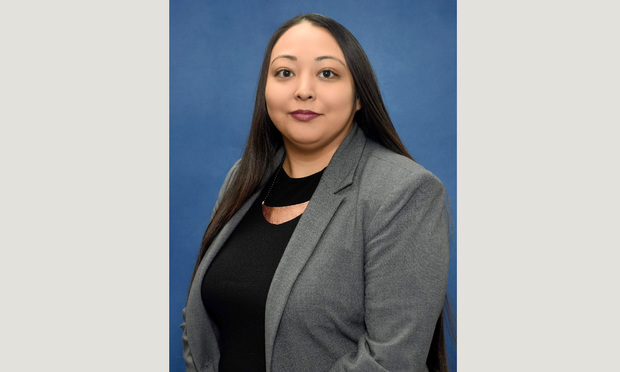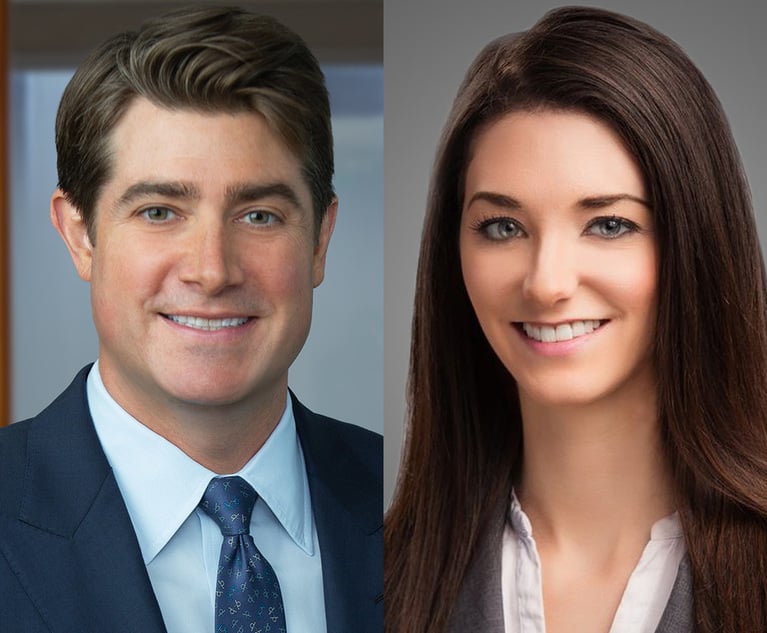Associate Spotlight: From Chickasaw Nation in Oklahoma to Big Law in California
Mari Halbutta says joining Sheppard Mullin will give her the chance to work on issues that matter to her fellow members of the Chickasaw Nation—from Native American law and policy to intellectual property.
June 05, 2020 at 09:10 AM
5 minute read
 Mari Hulbutta of Sheppard, Mullin, Richter & Hampton (courtesy photo)
Mari Hulbutta of Sheppard, Mullin, Richter & Hampton (courtesy photo)
Mari Hulbutta's path from Edmond, Oklahoma, to Columbia Law School to her new position at Sheppard, Mullin, Richter & Hampton was far from well-worn. Hulbutta, a member of the Chickasaw Nation, had no relatives in the profession, and Edmond, an Oklahoma City suburb, is hardly teeming with Big Law alums.
As she awaits her start date at Sheppard Mullin in Century City, California—the timing is still uncertain thanks to the COVID-19 crisis—The American Lawyer caught up with Hulbutta back in her native Oklahoma to discuss how she landed her role with one of the premiere Native American practices in the United States, and what it might take to open more opportunities for others like her.
The conversation has been lightly edited.
You didn't start your professional career as an attorney. How did you manage to get there?
After graduating from Columbia College for undergrad, I spent three years working in Washington, D.C., two of which were as a legal fellow for the National Congress of American Indians. It was a supervisor at that organization that let me know about a pipeline program to a major firm in Washington [not Sheppard Mullin]. I applied for it and was selected to be the inaugural fellow.
I was integrated into the law firm environment, and that time was critical to my decision to attend law school.
The purpose of the program was to identify a Native American student ready to go to law school. In that setting, my decision to go to law school was pretty much set in stone, but prior to that I had not worked in a strictly legal environment. I didn't have access to attorneys and was the first person in my family to go to law school. I didn't have a close network of attorneys to advise me on analytical skills.
After law school, I had offers from Sheppard Mullin and another firm, but the difference was that Sheppard Mullin was willing to provide flexibility to specialize in Native American law while still exploring IP litigation. More and more there is a growing need for Native American attorneys to be aware of IP law for tribal government. Why is that?
As tribal governments become more diversified and nuanced economic entities, there are legal questions on how they are involved with U.S. trademark law. Those questions could be answered by an IP attorney, as a resource for tribes entering the realm of IP, protecting trademarks for state-chartered businesses, or preventing nonaffiliated applicants from using trademarks that could have a false association with a tribal government, which is important for preventing the misappropriation of tribal names.
I have great respect for my tribal governor, [Bill Anoatubby] of Chickasaw Nation in Oklahoma, who has had a strong vision for diversifying the tribe's economic elements. We had success with gaming and are moving into other areas, like over 100 different tribal businesses.
COVID-19 has caused a lot of uncertainty for those entering the job market. How have you been affected?
In light of the pandemic, I am waiting to hear if my October start date is going to change at all. And since the California bar has been postponed until early September, I have more time to study, but the downside is not really knowing how the bar is going to be administered. As of today, the Supreme Court of California has not made a final decision as to how that is going to be administered. If it is online, I will stay in Oklahoma and then move in September. If it's an in- person exam, then I head out in July or August.
They might delay the start until January, as other firms have, so I wouldn't be surprised. It's all sort of in flux for me.
There is a dearth of Native American attorneys in Big Law. What measures would you see put in place to change that?
The first recommendation I have is more pipeline programs similar to the one I participated in. I started that fellowship in January of 2015 [Halbutta was the first participant in the program], which is very recently for a Big Law firm to not have any kind of pipeline in place for one of the highest-grossing Native American practices in the country.
Efforts need to be coordinated in other similarly situated Big Law firms that have strong tribal clientele.
There are a number of programs, such as ones from the Native American Bar Association and the Organization of Tribal Judges, all doing their respective programs for a clerkship or going to a firm or understanding how to obtain a J.D. as a Native American law student. But I think it would be interesting to see some of those efforts consolidated, and have some sort of a panel or other programming for students who have been admitted to law schools about what to anticipate, given that applications for first years in diversity programs can go out by the end of the first year of law school.
Knowing the different recruitment timelines for Big Law and general counsel opportunities would be helpful.
Read More
Cherokee Nation Vows to Keep Up Fight vs. Pharma Over Opioids Despite Legal Setback
This content has been archived. It is available through our partners, LexisNexis® and Bloomberg Law.
To view this content, please continue to their sites.
Not a Lexis Subscriber?
Subscribe Now
Not a Bloomberg Law Subscriber?
Subscribe Now
NOT FOR REPRINT
© 2025 ALM Global, LLC, All Rights Reserved. Request academic re-use from www.copyright.com. All other uses, submit a request to [email protected]. For more information visit Asset & Logo Licensing.
You Might Like
View All
White & Case Crosses $4M in PEP, $3B in Revenue in 'Breakthrough Year'
6 minute read
Haynes and Boone Expands in New York With 7-Lawyer Seward & Kissel Fund Finance, Securitization Team
3 minute read
'None of Us Like It': How Expedited Summer Associate Recruiting Affects Law Students and the Firms Hiring Them

Sheppard Mullin, Morgan Lewis and Baker Botts Add Partners in Houston
5 minute readLaw Firms Mentioned
Trending Stories
- 1Dissenter Blasts 4th Circuit Majority Decision Upholding Meta's Section 230 Defense
- 2NBA Players Association Finds Its New GC in Warriors Front Office
- 3Prenuptial Agreement Spousal Support Waivers: Proceed With Caution
- 4DC Circuit Keeps Docs in Judge Newman's Misconduct Proceedings Sealed
- 5Litigators of the Week: US Soccer and MLS Fend Off Claims They Conspired to Scuttle Rival League’s Prospect
Who Got The Work
J. Brugh Lower of Gibbons has entered an appearance for industrial equipment supplier Devco Corporation in a pending trademark infringement lawsuit. The suit, accusing the defendant of selling knock-off Graco products, was filed Dec. 18 in New Jersey District Court by Rivkin Radler on behalf of Graco Inc. and Graco Minnesota. The case, assigned to U.S. District Judge Zahid N. Quraishi, is 3:24-cv-11294, Graco Inc. et al v. Devco Corporation.
Who Got The Work
Rebecca Maller-Stein and Kent A. Yalowitz of Arnold & Porter Kaye Scholer have entered their appearances for Hanaco Venture Capital and its executives, Lior Prosor and David Frankel, in a pending securities lawsuit. The action, filed on Dec. 24 in New York Southern District Court by Zell, Aron & Co. on behalf of Goldeneye Advisors, accuses the defendants of negligently and fraudulently managing the plaintiff's $1 million investment. The case, assigned to U.S. District Judge Vernon S. Broderick, is 1:24-cv-09918, Goldeneye Advisors, LLC v. Hanaco Venture Capital, Ltd. et al.
Who Got The Work
Attorneys from A&O Shearman has stepped in as defense counsel for Toronto-Dominion Bank and other defendants in a pending securities class action. The suit, filed Dec. 11 in New York Southern District Court by Bleichmar Fonti & Auld, accuses the defendants of concealing the bank's 'pervasive' deficiencies in regards to its compliance with the Bank Secrecy Act and the quality of its anti-money laundering controls. The case, assigned to U.S. District Judge Arun Subramanian, is 1:24-cv-09445, Gonzalez v. The Toronto-Dominion Bank et al.
Who Got The Work
Crown Castle International, a Pennsylvania company providing shared communications infrastructure, has turned to Luke D. Wolf of Gordon Rees Scully Mansukhani to fend off a pending breach-of-contract lawsuit. The court action, filed Nov. 25 in Michigan Eastern District Court by Hooper Hathaway PC on behalf of The Town Residences LLC, accuses Crown Castle of failing to transfer approximately $30,000 in utility payments from T-Mobile in breach of a roof-top lease and assignment agreement. The case, assigned to U.S. District Judge Susan K. Declercq, is 2:24-cv-13131, The Town Residences LLC v. T-Mobile US, Inc. et al.
Who Got The Work
Wilfred P. Coronato and Daniel M. Schwartz of McCarter & English have stepped in as defense counsel to Electrolux Home Products Inc. in a pending product liability lawsuit. The court action, filed Nov. 26 in New York Eastern District Court by Poulos Lopiccolo PC and Nagel Rice LLP on behalf of David Stern, alleges that the defendant's refrigerators’ drawers and shelving repeatedly break and fall apart within months after purchase. The case, assigned to U.S. District Judge Joan M. Azrack, is 2:24-cv-08204, Stern v. Electrolux Home Products, Inc.
Featured Firms
Law Offices of Gary Martin Hays & Associates, P.C.
(470) 294-1674
Law Offices of Mark E. Salomone
(857) 444-6468
Smith & Hassler
(713) 739-1250










